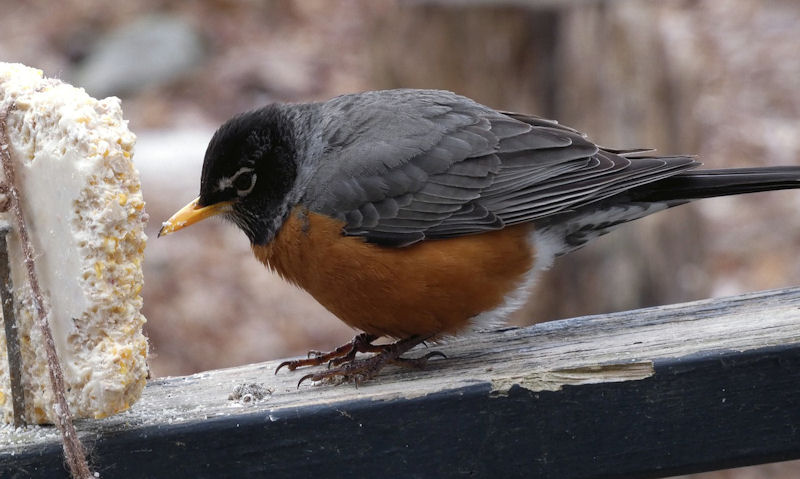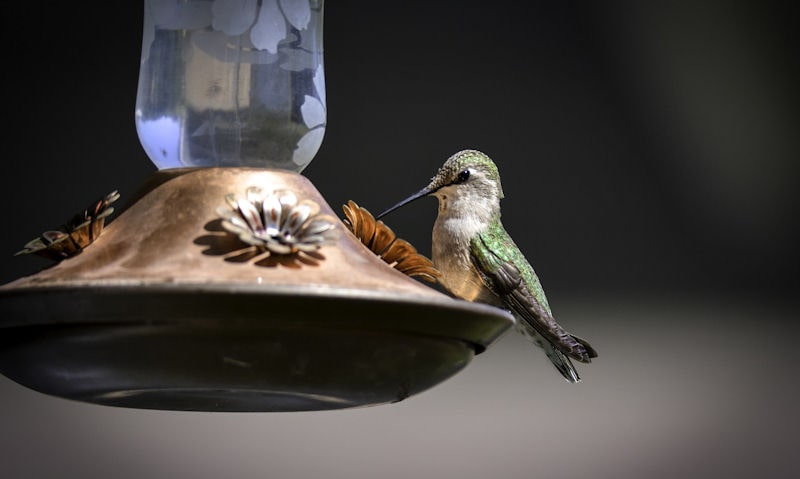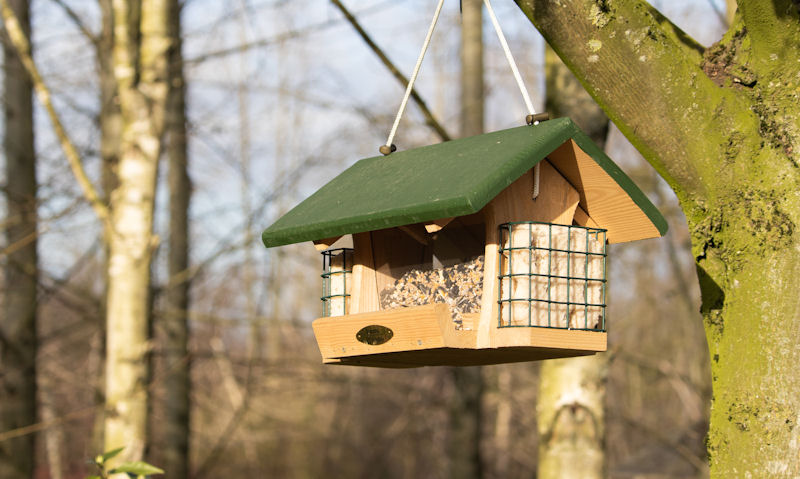Do American Robins eat suet
What you don't know about the Robin is they are the kind of bird who are willing to eat suet, yet its common for suet in all its forms to only be made available in a feeder.
American Robins do eat suet yet conditions are rarely met for Robins to feed on mealworm or insect-filled suet, where the suet cake or fat balls must be accessible out in the open. Why Robins are only occasionally seen eating suet, is because they are a less able bird feeder bird who forages on the lawn.
Rather than feed American Robins a mix of fruits or dried mealworms on their own, both can be provided in an energy infused suet cake.
How you'd feed American Robins mealworms will be on the lawn or on top of an open tray. Well, same goes for suet as this rather hard at first suet block will become inaccessible if fed to Robins in a suet feeder as normal.
American Robins will only eat suet if fed to them in an accessible way like offering suet out in the open, as oppose to shutting it away in a hanging suet feeder.
Robins are only seen to feed on suet on the occasions it allows them to, which is when an accessible mealworm or fruit-filled suet cake or fat balls, is provided to Robins out in the open.
With American Robins primarily focused on foraging for insects on the lawn, you can't expect an insect-eating, ground feeding bird bird to come to rely on a feeder.
Its therefore not in a Robins interest to come to rely upon a suspended bird feeder that isn't anywhere closed to filled with what they eat in the wild.
I would provide suet cakes laid out on their sides on top of a platform bird feeder, with an option to keep suet cakes within its feeder; with the suet feeder laid on its side within the open top platform bird feeder or tray.
Robins do occasionally eat suet
While an American Robin can be found mostly feeding on fruits or dried mealworms laid out on the platform bird feeder, you'll also find Robins will eat suet when is made available.... and accessible as it happens.
Robins will certainly eat fruit or mealworm-filled suet yet its made more available to more bird feeder able birds, thus American Robins must go without.
Robins are not big on seeds either thus what are primarily seed or nut-filled suet cakes or fat balls, these common suet ingredients aren't part of an American Robins diet in the wild, thus they will miss out on this energy replacement bird feed.
For all tense and purposes, an American Robin will only be seen eating available suet on the rare occasion all this adds up in to their favor.
Rarely will American Robins eat at regular suspended bird feeders, with their limited dietary needs not often provided in said feeders.
Suet is a bird feeder food - or more specifically a suet bird feeder food - which isn't something a ground bird feeding Robin will come across in their daily foraging habitat.
On the occasional you have fruit or mealworm-filled suet along with Robins seen to come and go in your yard - then situate the suet cakes out in the open - as oppose to locking suet away in a difficult to access suet cage feeder.
Suet must be accessible
With an American Robins somewhat limited ability on a small compact bird feeder - due to their reliance on foraging for feed on the lawn 99% of the time - let's think about making suet accessible to this not very good at feeders, wild bird.
And you won't see Robins bite your suet if its anything else other than mealworm or fruit-filled suet, thus its important to never take their basic dietary needs likely.
What is the best bird feeder for Robins to access are only open to the elements' feeders.
What this kind of bird feeder is are essentially open dishes or metal trays that can be mounted or suspended on the pole bracket or branch with a chain to steady it all on.
Robins can access this tray that provides suet in all its forms, where Robins will perch on one of four sides of the tray rim.
Personally, where I would favor to hang a Robins accessible bird feeder tray, is to suspend it directly over the lawn; as its near the same well lit up area of the lawn where American Robins are seen to forage in your yard.
Lawns are a great way to attract Robins to your yard yet an open bird feeder hung above it that is filled with mealworm or fruit suet, is even a better way to actually get Robins to eat your suet, personally made available to them.
With primarily suet cakes offered that must be laid flat on their side, in an exposed to the elements feeder, Robins will still eat a little bit at a time.
Suet cakes or fat balls on platform
Bird feeder platforms are primarily made on a solid stand for you to position anywhere in your yard, with the center of your lawn being the better location.
Robins can be expected to perch around the outer rim of this commonly made in wood platform feeder - with Robins also seen stepping on the bird feed - in an effort to find their favorite mealworms, or if an assortment of fruit is made available.
Less so used is an hanging type platform bird feeder because Robins like a steady, stabilized bird feeder to access.
Regardless, you can absolutely expect American Robins to feed on both options if it continues to be accessible.
Best way to feed American Robins is with other wild birds on a wide open platform for birds to forage for their favorites.
Robins must have their berries like strawberries or cherries available along with dried or live mealworms at certain times of the year.
Robins can be fed on apples for a bit of fun and so to can banana slices to be offered to Robins, next to the suet you intend to use.
Lay suet cakes within the mix of bird feed for all birds to take, and not just Robins.
With that, you can steady fat balls if that is what you are using which can be stabilized, and therefore preventing rolling - by pushing the bird feed below the rolling balls.
Fruit or insect suet favorable
While I believe you should feed American Robins is mealworms in the live or dried kind, and alongside this must be a mix of small fruits at the same time.
To attract Robins to suet if you aren't getting any interest thus far - and what will it take to attract Robins on an open platform feeder - is what they love to eat at bird feeders.
All while bear in mind Robins don't eat or will rarely be seen to eat seeds on feeders.
What two types of suet you can provide for Robins will include the following:
- Insect-filled suet: prioritize in mostly summer yet is the kind of suet ingredients you can provide for Robins all year round
- Fruit-filled suet: fruit is what Robins eat 60% of the year, thus fruit-filled suet cakes are sure to go down well with Robins
Mealworm-filled suet cakes will be mostly be eaten by Robins in summer time yet will be taken all year.
Whereas fruit-filled suet will be eaten all year too while at the same time Robins just may prioritize this insect flavor suet more for winter.
It can be a waste of your time providing any other kinds of suet, unless it provides the feed what is part of American Robins natural diet in the wild.
To summarize
American Robins 100% do eat suet in all its form, with suet cakes the prime focus of any Robins who can access it without restrictions.
Robins will eat suet if its made with mealworms or fruits, because this is what is part of their natural diet in the wild. While wild berries are replaced with small fruits, dried mealworms will be a substitute for many kinds of insects eaten in the wild.
Unfortunately for an American Robin the conditions people set to attract wild birds to what is a suet bird feeder, isn't what a Robins has evolved to access.
Sure, Robins can be seen occasionally clinging awkwardly on the side of a suet cake feeder to eat, but it isn't easy for 99% of Robins.
Its because of this Robins are only found to occasionally eat suet in our yards.
If suet cakes or fat balls were made available to less able insect-eating, mostly ground feeding birds - you just may see an uptake in birds eating the suet.


